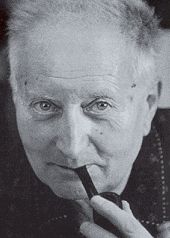Jean Giono
| Jean Giono | |
|---|---|
 |
|
| Born |
30 March 1895 Manosque, France |
| Died | 8 October 1970 (aged 75) Manosque, France |
| Occupation | Writer |
| Nationality | French |
| Literary movement | Popular culture |
| Notable works | |
| Website | |
| www |
|
Jean Giono (30 March 1895 – 8 October 1970) was a French author who wrote works of fiction mostly set in the Provence region of France.
Jean Giono was born to a family of modest means, his father a cobbler of Piedmontese descent and his mother a laundry woman. He spent the majority of his life in Manosque, Alpes-de-Haute-Provence. Forced by family needs to leave school at the age of sixteen and get a job in a bank, he nevertheless continued to read voraciously, in particular the great classic works of literature including the Bible, Homer's Iliad, the works of Virgil, and the Tragiques of Agrippa d'Aubigné. He continued to work at the bank until he was called up for military service at the outbreak of World War I, and the horrors he experienced on the front lines turned him into a lifelong and ardent pacifist. In 1919, he returned to the bank, and a year later, married a childhood friend with whom he had two children. Following the success of his first novel, Colline (1929) (which won him the Prix Brentano and $1,000, and an English translation of the book), he left the bank in 1930 to devote himself to writing on a full-time basis.
Colline was followed by two more novels heavily influenced by Virgil and Homer, Un de Baumugnes (1929) and Regain (1930), the three together comprising the famous “Pan Trilogy”, so-called because in it Giono depicts the natural world as being imbued with the power of the Greek god Pan. The other novels Giono published during the nineteen-thirties on the whole continued in the same vein, set in Provence, with peasants as protagonists, and displaying a pantheistic view of nature.Marcel Pagnol based three of his films on Giono’s work of this period: Regain, with Fernandel and music by Honegger, Angèle, and La Femme du boulanger, with Raimu.
...
Wikipedia
